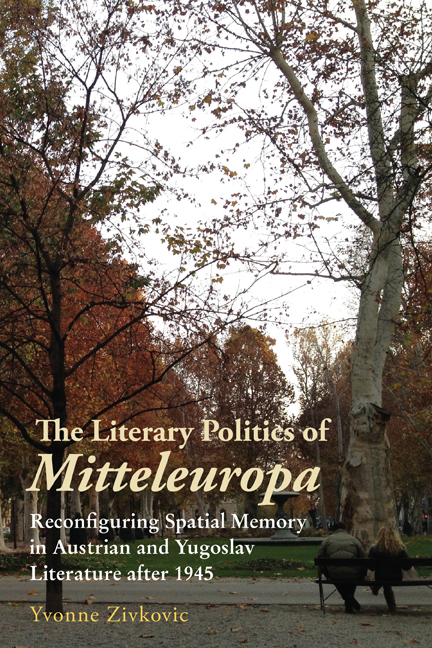 The Literary Politics of Mitteleuropa
The Literary Politics of Mitteleuropa Book contents
- Frontmatter
- Contents
- Acknowledgments
- Abbreviations and Note on Translations
- Introduction: Mitteleuropa as a Transnational Memory Discourse
- 1 The Legacy of Mitteleuropa: Between Geopolitics and Geopoetics
- 2 Ingeborg Bachmann and Peter Handke: The Austrian Mitteleuropa
- 3 Mitteleuropa as Conflicted Community in the Writings of Danilo Kiš and Aleksandar Tišma
- 4 Mitteleuropa after 1989: New Memory Challenges in Christoph Ransmayr and Dubravka Ugrešić
- Conclusion: Mitteleuropa Literature in the Twenty-First Century: Revisiting the Promise of Border-Crossing
- Bibliography
- Index
Conclusion: Mitteleuropa Literature in the Twenty-First Century: Revisiting the Promise of Border-Crossing
Published online by Cambridge University Press: 23 March 2021
- Frontmatter
- Contents
- Acknowledgments
- Abbreviations and Note on Translations
- Introduction: Mitteleuropa as a Transnational Memory Discourse
- 1 The Legacy of Mitteleuropa: Between Geopolitics and Geopoetics
- 2 Ingeborg Bachmann and Peter Handke: The Austrian Mitteleuropa
- 3 Mitteleuropa as Conflicted Community in the Writings of Danilo Kiš and Aleksandar Tišma
- 4 Mitteleuropa after 1989: New Memory Challenges in Christoph Ransmayr and Dubravka Ugrešić
- Conclusion: Mitteleuropa Literature in the Twenty-First Century: Revisiting the Promise of Border-Crossing
- Bibliography
- Index
Summary
ETIENNE BALIBAR HAS argued that, when talking about Europe today, one faces “the dissolution of the object itself. Europe, in a sense, is a phantom of the past, a name that ‘is history’ rather than society, politics, economics.” The same has been observed about Mitteleuropa, and yet its manifestations in the literary imaginary still abound. I believe that the postwar idea of Mitteleuropa as reflected by the authors in this book is still relevant, since the challenges that first inspired its transnational, multiethnic, and plurilingual vision at the beginning of the twentieth century still persist, and are in fact undergoing a new revitalization almost a hundred years later. As I discussed in the last chapter on Ransmayr and Ugrešić, the end of the Cold War has prompted a plethora of memory revivals, whether in the form of revisionist projects and their respective nationalisms, or through the opening of archives that revealed new facts about the crimes of fascist and communist regimes. This has caused a remapping of the Central European topography of terror that is still not completed. A recently published study by the United States Holocaust Memorial Museum expanded the number of ghettoes and death and labor camps during the National-Socialist period to a shocking extent.
The postwar debate on Mitteleuropa as both utopian vision and reminder of difficult memory, but also as a critical mindset, remains relevant since the European Union's expansionist and neoliberal economic agenda has re-established the colonialist power dynamics against which the Mitteleuropa writers had originally spoken out. The promise of a borderless Europe, of a free-floating exchange of culture, has not been fulfilled for all—instead, as Balibar has pointed out succinctly, the new Europe, by means of its rigid security and immigration policies, has become defined by borderlands. Against a mindset of fearful territoriality, Balibar proposes a new vision of a de-territorialized European citizenship, based on “the European alternative, a European space which would become a land of differences,” that is, a space where pluralism and diversity are actively embraced. These thoughts echo the verdict of Moritz Csáky, who has recently argued that the manifestations of globalization have highlighted Central Europe as a long-established space of cultural exchange through and despite differences, making it an ideal template for a “differenztheoretische Hermeneutik” (a hermeneutics based on theories of differences) that may offer insights into contemporary conflicts around mobility and migration.
- Type
- Chapter
- Information
- The Literary Politics of MitteleuropaReconfiguring Spatial Memory in Austrian and Yugoslav Literature after 1945, pp. 277 - 288Publisher: Boydell & BrewerPrint publication year: 2021


